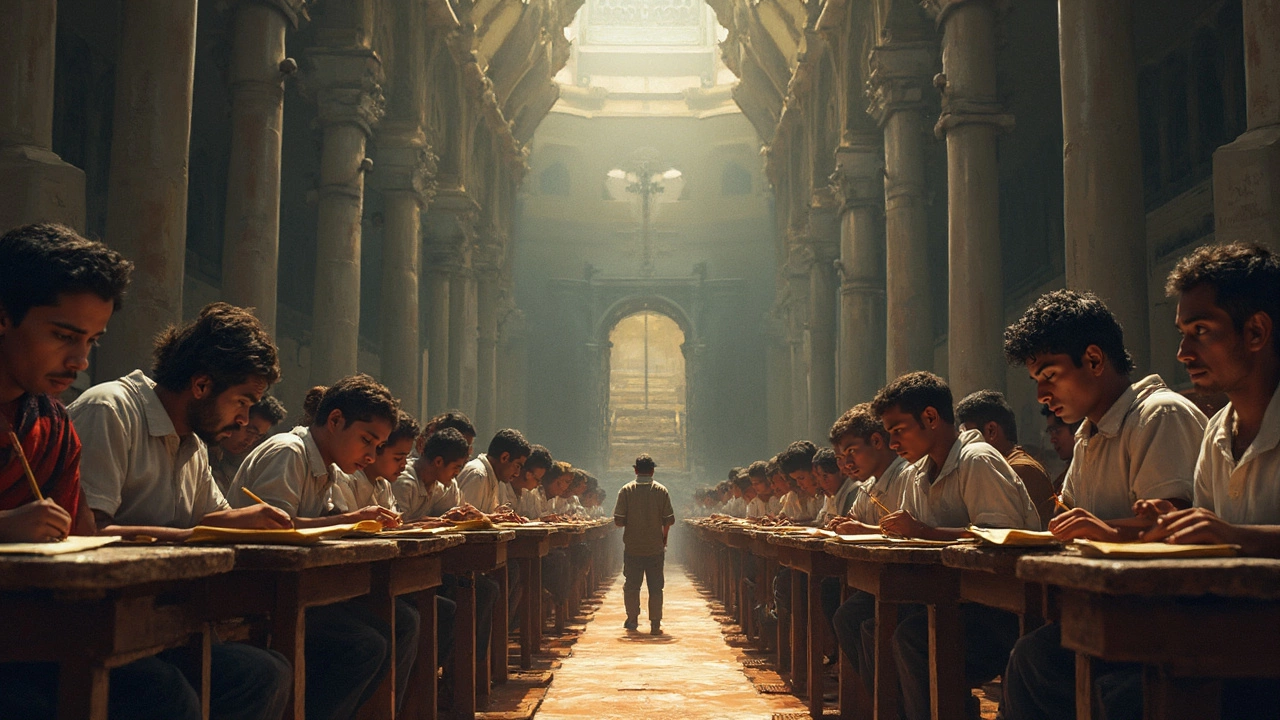Ever wondered what the hardest exam in the world is? It's a hotly debated topic, and opinions vary widely depending on who you ask. For some, it’s the grueling civil service exams in certain countries, while others point to the notoriously tough medical licensing tests that make even the most seasoned students sweat.
Defining what makes an exam 'hard' isn't just about the pass rates. It’s a mix of several factors like the depth of knowledge required, the pressure of the time limits, and the overall difficulty of the questions. Some exams challenge your mental endurance and critical thinking skills, demanding not just rote memory but real understanding and application.
Take for example, the Indian Civil Services exam. It’s a beast of a test spread over months, filtering out even the most dedicated aspirants. Then there’s the CPA exam in the U.S., which tests accounting professionals to the limit, turning up the heat with complex scenarios and intricate problem-solving questions.
- Defining Difficulty in Exams
- Famous Tough Exams Around the World
- What Makes an Exam So Hard?
- Tips for Surviving Tough Exams
- Real Stories from Exam Survivors
- Why Do Such Hard Exams Exist?
Defining Difficulty in Exams
So, what makes an exam stand out as particularly tough? It's not just about brain-busting questions. There's the time crunch, the vastness of the syllabus, and of course, the pressure of the competition. Let’s break down what contributes to an exam being labelled the hardest exam.
First off, there's the sheer volume of material you need to know. Tests like these often cover an extensive range of topics, demanding a deep and thorough understanding. Think about the bar exam in the United States. Aspiring lawyers often have to study multiple areas of law, each complex in its own right.
Next, there's the level of detail required in your answers. Some exams don’t just want you to regurgitate facts but expect you to apply concepts critically. The medical exams, like the USMLE, are a prime example. One medical student said, "The hardest part isn't knowing the facts—it's being able to connect them when you're under the gun and exhausted."
Carl Sagan once said, "Extraordinary claims require extraordinary evidence," a fitting nod to what these difficult exams demand from their takers.
Then comes the pressure. High-stake exams often mean a lot rides on passing. Take India’s UPSC Civil Services exam where only a tiny fraction of the hundreds of thousands make the cut.
Lastly, the format and testing environment play a role. Is it a long exam with hundreds of questions, or multiple difficult sections? And all this combined can feel daunting, to say the least.
While hard exams can seem like they’re designed to trip you up, keep in mind they're also building resilience and deep understanding. If you're facing one, like the toughest tests mentioned, focus on preparation and stay calm—it’s all about taking it one step at a time.
Famous Tough Exams Around the World
Alright, let's get into some of the world's toughest tests. If you're thinking of taking one of these, maybe stock up on coffee and good luck charms!
First up, we have China's Gaokao exam, which is practically legendary in its difficulty. Every year, millions of Chinese high school students prepare for this test, which determines their college admissions. The Gaokao is so intense that it’s been compared to being one of the hardest exams in the world primarily because it covers a wide range of subjects, from literature to math, often lasting up to nine hours over two or three days. No wonder students and their families feel immense pressure.
Next, we head to India. The title of the hardest exam may very well go to the Union Public Service Commission (UPSC) exams. This one's notorious for its low success rates, with only a tiny fraction of applicants making it through. The exam, especially the Civil Services Examination, tests candidates on everything from history to current affairs. It doesn't just require knowledge, but analytical thinking and decision-making skills too.
Let's not forget about Japan's National Center Test for University Admissions, now called the Common Test for University Admissions. Like the Gaokao, it's a critical stepping stone for Japanese students eyeing top university spots. The pressure is real, and the competition is fierce.
The United States also has its share of demanding exams. The Uniform CPA Examination challenges the mettle of budding accountants. This four-part marathon covers auditing, regulation, financial accounting, and more, and requires a passing score of at least 75% on each section.
In the land down under, Australia's Queensland Core Skills (QCS) Test is known for being tricky. Though it was phased out recently, it was once a crucial determinant of students' Overall Position rankings, which affected university entry.
These challenging assessments are not just tests of knowledge but are often tests of endurance and mental resilience. Each has its quirks and difficulties, shaping how we view the role of exams in education systems worldwide.
What Makes an Exam So Hard?
It's no secret — some exams are just notoriously difficult. But what exactly makes an exam hard? It’s a combination of different factors that come together to create mind-boggling challenges.
First, there’s the sheer volume of knowledge required. Take the USMLE (United States Medical Licensing Examination), for example. This test covers an overwhelming amount of medical information across basic sciences and clinical knowledge, pushing medical students to the edge of their capacity.
Another factor is time pressure. Many tough exams like the GRE or GMAT are designed with tight time limits to test not just what you know, but how quickly you can apply it. The ability to manage your time effectively becomes just as crucial as the knowledge itself.
- Tricky questions: Some exams throw in questions designed to stump even the best-prepared candidates. They can include misleading information or require complex problem-solving.
- High Achievement Bar: Especially in competitive settings like the SAT or ACT, where thousands of candidates are battling for top scores and limited spots at prestigious institutions.
- Complex Structure: Exams like the bar exam for lawyers consist of multiple parts including both written essays and multiple-choice questions, each testing different skills and knowledge areas.
Finally, there’s the emotional and physical toll. Imagine sitting in a room for hours, with the ticking clock as your only companion while your brain races through a labyrinth of equations or legal principles. It’s no wonder test fatigue is a real thing!
As if that's not enough, consider the make-or-break stakes involved. For many of us, passing these competitive exams spells the difference between achieving a dream career or having to find a new path.
Understanding these factors can help shape your prep strategy, whether it means starting your studies early, working on time management, or planning breaks so your brain doesn’t burn out halfway through. That way, you can face these challenging exams with a bit more confidence.

Tips for Surviving Tough Exams
Facing one of those head-scratching exams that people label as the hardest exam ever? Trust me, it’s all about strategy and keeping your cool. Here are some survival tips that might just save your bacon.
Understand the Format: Before you even think about cracking those books, get to know the exam format inside out. Know how it’s structured, the types of questions, and the timing. This isn't just about passing; it's about acing it the smart way.
Study Schedule: Set up a study schedule and stick to it. Break down the material into chunks and tackle them daily. Consistency beats cramming, every time. It's like training for a marathon; slow and steady wins the race.
Practice, Practice, Practice: Can’t stress this enough. Work through past papers to get a feel for the questions. Time yourself to simulate the real deal. This turns anxiety into muscle memory.
Join Study Groups: Sometimes two brains are better than one. Form or join study groups. Bounce ideas off each other and clarify doubts. You'll be surprised by how group discussions can open up new perspectives.
Stress Management: It’s not just about knowledge; keeping stress in check is crucial. Take regular breaks, exercise, or even try out some mindfulness exercises. A relaxed mind performs much better.
And, if numbers get your juices flowing, here’s a quick stat to chew on: According to a 2024 study, students who practiced mindfulness regularly scored 12% higher in mock exams than those who didn’t. Just sayin'.
Healthy Lifestyle: Eat well, stay hydrated, and manage your sleep. Pulling all-nighters might seem heroic, but it’ll likely hurt more than help. A well-rested mind is sharper and retains information better.
- Embrace your mistakes. They’re great teachers.
- Ignore distractions. Turn that phone off.
- Keep a positive mindset. Believing in yourself is half the battle won.
Remember, every test is just a step on your journey, not the defining moment of your life. Tackle it smartly, and know that every bit of effort counts. You've got this!
Real Stories from Exam Survivors
If you've ever faced an exam that seemed impossible, you're not alone. Many students and professionals have been in the same boat. Let's dive into some real-life stories from people who have tackled some of the hardest exams in the world.
Alice, a young medical graduate, remembers the dread before her USMLE steps. She talks about how she balanced her day with intense study sessions and short breaks to recharge. Her advice? Tackle subjects you find toughest at the start of your day when your brain is fresh.
Then there's Arjun, who cracked the IIT JEE, one of the most competitive exams in India. He emphasizes how important it was to stay consistent with his study schedule and regularly practice with mock tests. "It wasn’t just about what I studied, but how I managed my time and stress," he shares.
James, an accountant who survived the CPA exam, recalls how practice was key. "The simulations in the actual exam felt a little less scary after you’ve done countless practice ones," he jokes. His tip? Don’t underestimate the power of a well-organized study group.
Not to forget Sara, who tackled the daunting UPSC exam, known for its unpredictability. Her strategy involved immersing in newspapers and current affairs daily. She stresses that understanding the why behind facts is more important than just knowing the what.
Here's a quick table showing some of the toughest exams these survivors tackled:
| Exam | Location | Pass Rate |
|---|---|---|
| USMLE | USA | 95% (for Step 1) |
| IIT JEE | India | Less than 1% |
| CPA | USA | Approximately 50% |
| UPSC | India | 0.1%-2% |
These stories show how grit, strategy, and flexibility can make a huge difference when tackling the toughest exams. Everyone’s approach is unique, but what ties them together is their commitment.
Why Do Such Hard Exams Exist?
You might wonder why on earth we have these hardest exams in the first place. The answer often boils down to two main reasons: ensuring the competence of individuals entering particular professions and maintaining high standards within those fields.
Let's face it, nobody wants to be treated by a doctor who barely scraped by an easy exam or have their finances managed by an accountant who guessed their way through. These competitive exams serve as a pivotal checkpoint, ensuring only the most qualified get through to handle crucial responsibilities.
In many cases, these tough exams are a sort of rite of passage. Think of the Japanese University entrance exams or the Indian Civil Services exam. They’re like the ultimate obstacle course designed not just to test knowledge, but to evaluate perseverance, problem-solving under pressure, and determination.
Moreover, there's a supply and demand aspect at play. In fields with high demand and limited spots, like top corporate roles or prestigious university programs, these challenging assessments are a way to filter the best from the rest. By making the exam hard, organizations can ensure they’re cherry-picking the crème de la crème of talent.
According to a study by the National Testing Agency in India, only about 0.1% of candidates who appear for these exams actually score top ranks. This stat alone highlights just how selective these processes are meant to be.
In summary, it's not about making students and professionals suffer. It's about ensuring that the individuals who emerge on the other side are genuinely prepared, competent, and ready to uphold the standards expected of them.

